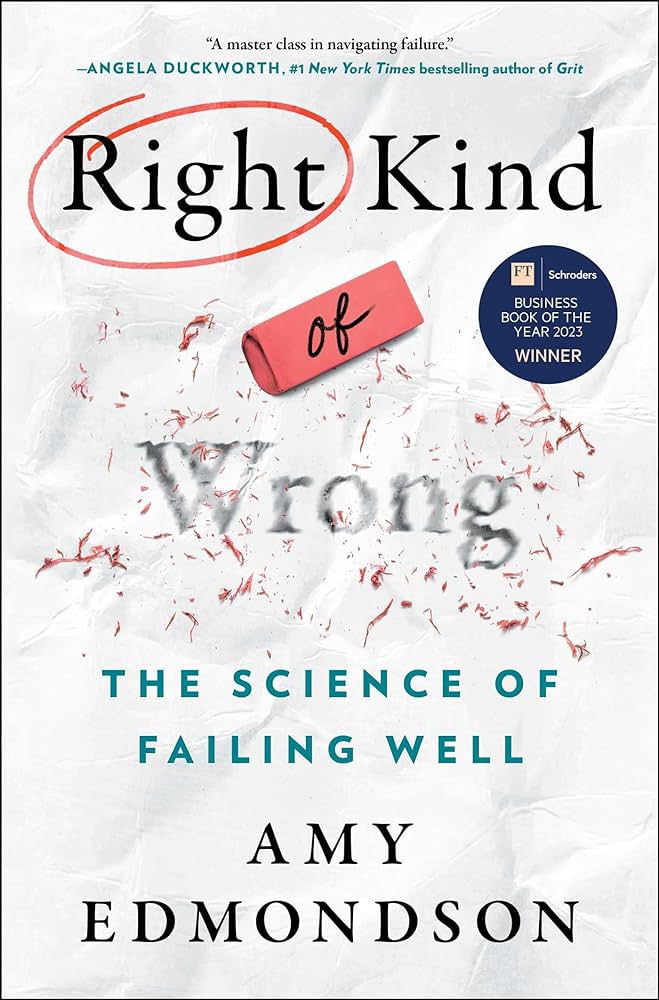Right Kind of Wrong deconstructs failure into three types (intelligent, basic, and complex), with a focus on explaining how to fail well. Intelligent failures result from taking carefully selected and survivable risks in new domains where the ability to succeed cannot be known in advance. This is the learning that propels us forward. In contrast, basic failures are errors occurring in established domains and should be avoided and minimized. Lastly, complex failures have multiple small factors that crescendo past a breaking point, resulting in a sudden unexpected disaster.
A crucial element to failing well is having a psychologically safe environment. This is where people believe that they won’t be chastised for speaking up or admitting mistakes. Pointing out small concerns early makes them known and fixable. Having a culture that embraces needing to fail to move forward in unproven domains gives people the courage to be creative.
This book has given me the confidence to more ambitiously learn and try new things while not sacrificing the discipline to maintain excellent work.
You should read this book if you…
- need a better guide to delineate between embracing vs minimizing failure
- want to learn about how to create a psychologically safe environment
- seek understanding on how complex failures manifest
Additional Information
Year Published: 2023
Book Ranking (from 1-10): 8 – Very Good – In depth insights on a specific topic
Ease of Read (from 1-5): 4 – Moderately challenging
Key Highlights
- These failures are “intelligent,” as my colleague Duke professor Sim Sitkin first suggested back in 1992, because they involve careful thinking, don’t cause unnecessary harm, and generate useful learning that advances our knowledge
- Intelligent failures provide valuable new knowledge. They bring discovery. They occur when experimentation is necessary simply because answers are not knowable in advance
- My eureka moment was this: better teams probably don’t make more mistakes, but they are more able to discuss mistakes
- I define failure as an outcome that deviates from desired results. In short, failure is a lack of success. Next, I define errors (synonymous with mistakes) as unintended deviations from prespecified standards, such as procedures, rules, or policies
- Three failure archetypes: intelligent, basic, and complex. Understanding this taxonomy will give you a deeper understanding of failure’s mechanisms and of what it means to fail well
- Ironically, our aversion to failures makes experiencing them more likely
- Most of us don’t stop to challenge our spontaneous emotional responses to the events in our lives. But you can learn how to do this—and it’s a crucial skill to bring more learning and joy into your life
- Psychological safety—an environment where you don’t fear rejection for being wrong—is the antidote to the interpersonal fear that prevents us from failing well
- What makes a failure qualify as intelligent? Here are four key attributes: it takes place in new territory; the context presents a credible opportunity to advance toward a desired goal (whether that be scientific discovery or a new friendship); it is informed by available knowledge (one might say “hypothesis driven”); and finally the failure is as small as it can be to still provide valuable insights
- These are basic failures. Unlike intelligent failures, which occur in unknown territory, basic failures involve errors in well-trodden terrain. Basic failures are not the right kind of wrong. In the continuum of failure types, they are farthest from intelligent failures. Basic failures are unproductive—wasting time, energy, and resources. And they are largely preventable
- this fascinating asymmetry: when we see others fail, we spontaneously view their character or ability as the cause. It’s almost amusing to realize that we do exactly the opposite in explaining our own failures—spontaneously seeing external factors as the cause
- Complex failures have more than one cause, none of which created the failure on its own. Usually a mix of internal factors, such as procedures and skills, collides with external factors, such as weather or a supplier’s delivery delay. Sometimes, the multiple factors interact to exacerbate one another; sometimes they simply compound, as with the straw that broke the camel’s back
- This is more than vigilance. When people are given permission to amplify and assess weak signals (such as with an Andon Cord or a rapid response team), they are invited to engage wholeheartedly in the work—to embrace its inherently uncertain nature, to believe that their own eyes and ears and brains matter
- How do I know I am right? It’s a powerful question. Failing well, perhaps even living well, requires us to become vigorously humble and curious—a state that does not come naturally to adults
- It seems we’re pretty good at learning from other people’s failures! In real life, however, we often don’t hear about them
- Shame is a belief that “I am bad.” Guilt, in contrast, is a realization that “what I did is bad.”
- Larry Wilson put it simply: Are you playing to win? Or playing not to lose? Playing to win meant a willingness to take risks in pursuit of challenging goals and satisfying relationships. Playing not to lose, which most of us do most of the time, meant avoiding situations where failure was possible
- It’s hard to learn if you already know. Unfortunately, we are hardwired to feel as if we know—as if we see reality itself rather than a version of reality filtered through our biases, backgrounds, or expertise. But we can unlearn the habit of knowing and reinvigorate our curiosity
- they come to the game with a strong assumption: if everyone optimizes their own performance, the team will do well. Alas, this is faulty logic. Everyone’s actions affect others in the system
- Appreciating the dynamics of systems is the last of the three competencies for practicing the science of failing well. After self-awareness and situation awareness is system awareness. Mastering system awareness starts with training yourself to look for wholes rather than zooming in, as we naturally do, on the parts. It’s about expanding your focus, even if briefly, to redraw the boundaries and see a larger whole and the relationships that shape it
- “One of the greatest underrecognized privileges of whiteness might be the license it gives some to fail without fear.” He explains that being a member of a minority culture often means your failures, especially if they become public, are seen as representative of an entire group
- Hobbies present a great arena in which to practice failure. Hobbies are about fun and the stimulation of learning something new rather than about achievement or making a living—a low-stakes context. Also, it is less embarrassing to fail at a new hobby than in your career. Remind yourself that it’s okay to be bad at something on the way to getting better at it. Whether learning a new language or a new skill, trying something new in any context builds muscle for risk-taking when the stakes are higher

Discover more from The Broader Application
Subscribe to get the latest posts sent to your email.
